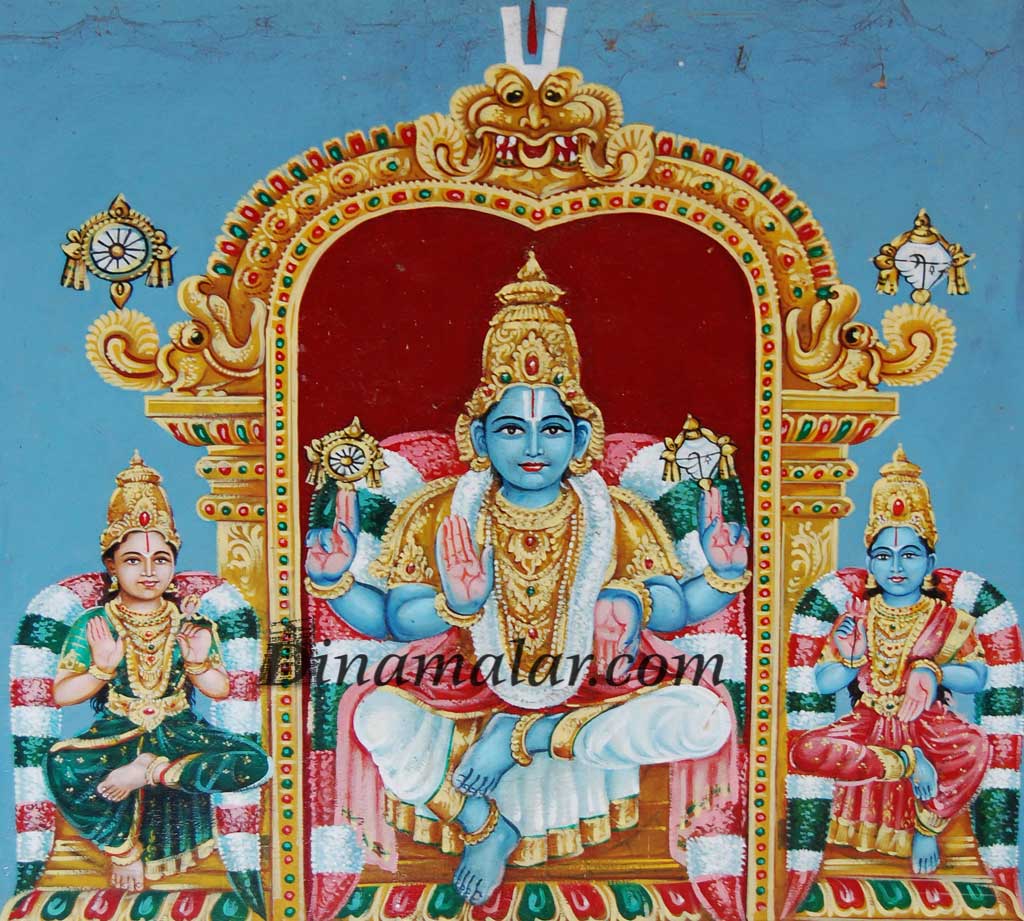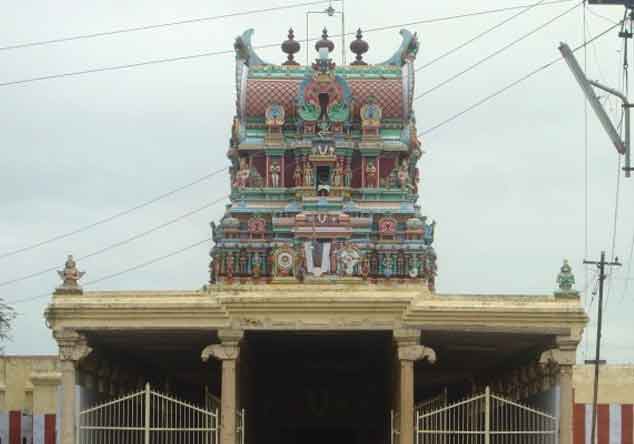GITA 2.81
AzhvArkaL vaazhi aruLiccheyal Vaazhi
thAzhvathum il kuravar thAmm vaazhi -yEzh paarum
uyya avarkaL uraitthavaikaL thaamm vaazhi
seyya maRai tannudanE sErnthu
thAzhvathum il kuravar thAmm vaazhi -yEzh paarum
uyya avarkaL uraitthavaikaL thaamm vaazhi
seyya maRai tannudanE sErnthu
This is a pasuram from Upadesa Rattinamalai by Swamy Manavala Mamunikal. Our elders have been singing Pallandu for Alwars. Why do we pray that the Alwars should live long [Pallandu]? It is they who have exposed God’s qualities and His omnipresence. If only God is imagined to be of atomic in size and had not appeared before great sages and Alwars, many would have never believed in the existence of God. Many would not have made any efforts to understand God. His beautiful forms have turned many atheists to great devotees. Today, if we have any interest in Him or His qualities or His actions, it is all because of Alwars hymns. Nammalwar leads all the Alwars and we are now in one more Kshetram in the Navathiruppathi.
This Kshetram is known as Thiruppulingudi and here the Lord is in a reclining posture. Here He is called Sri Bhoomi Palan, which means King [administrator] of Earth. The exact Tamil translation is Sri Kasini Vendhan and so He is called.
The Reclining posture is always considered a grade better than the sitting or standing postures. At His feet on either side, Sri Sridevi and Sri Bhoodevi are seated serving the Lord. Nammalwar prays to God that just as these two Consorts and like Lakshmana in Srimad Ramayana, He should be asked to serve the Lord. After all, he is just nearby in Alwar Thirunagari. From this Kshetram we will see the 71st sloka. As mentioned earlier, 69th 70th and 71st slokas describe different stages of a gyani who had atman darshan. The 69th sloka mentions the highest stage and 70th sloka mentions one in a slightly lower level.The person mentioned in 69th sloka does not see any of the worldly matters. This is same as Vaseekara samgya. For the person in 70th sloka, the worldly matters are all felt and seen. But he is immune to them and these worldly matters inflict no changes on him. Now we have to see the 71st sloka. Here the person is at his initial stage taking efforts for atman darshan. From this level he upgrades himself to the level mentioned in 70th sloka and then further uplifts him to the level indicated in 69th sloka.
vihaya kaman yah sarvan
pumams carati nihsprhah
nirmamo nirahankarah
sa shantim adhigacchati
pumams carati nihsprhah
nirmamo nirahankarah
sa shantim adhigacchati
A person who has given up all desires for sense gratification, who lives free from desires, who has given up all sense of proprietorship and is devoid of false ego--he alone can attain real peace.
"A person who has given up all desires for sense gratification, who lives free from desires, who has given up all sense of proprietorship and is devoid of false ego—he alone can attain Moksham"
The person mentioned here starts his efforts. We can listen to the levels in 69th and 70th slokas, but very difficult to achieve. But the 71st sloka is intended for ordinary persons like us. Yah puman- that Jeevatman or person, vihaya Kaman- discarding all sensual pleasures, nisprahah- should abandon all desires. To do this he should be nirmamao- not claiming possession or the feeling ‘my’. Also he should have the feeling of nirahankara or not imagining body as soul or atman. Such a person would lose interest in material pleasures and would attain Moksham or eternal bliss. Shantim means desireless, not involving in materialistic pleasures and brahma prapti or reaching the God. Here Sri Krishna tells what one has to do to get that peace and eternal bliss. First step is nirahankaraha. Next is nirmamaha. Next is nishprahaha. Next is vihaya Kaman and finally atman darshan. To have atman darshan, we have to follow the four steps. We have to first destroy ahankaram. Normally this is commonly used to indicate pride. We should know why this comes? When someone does not do what we want, we abuse him and start finding faults with every action of him. This happens because we think atman and body are same. Aham is self or soul and we assume it is body, it is called, ahankaram. The soul is not man or tree or an animal. The bodies of all these do not have the intellect or gyana. But Atman has intellect. Without understanding the basic difference between soul and body, we start assuming atman is body, then we are said to have ahankaram. What is the advantage in differentiating atman from body? When it is exam time, we are to study all night without sleeping. But we feel 'I am getting sleep or I feel sleepy’. But actually, it is the body, which requires rest and sleep. Atman never gets tired and so does not need rest. If this correct perception is there during exam time, then we can throw off that laziness and sleep, and study. But by going the way the body requires, one would feel asleep and may not be able to study. A sprinter, when reaching the winning pole never thinks of the aching legs but thinks only of victory. At this point the sprinter looks at atman as different from body. This is a great advantage to progress. Next, we should discard the mamakaram or assuming proprietorship. In this world nothing is ours and we carry nothing when departing from this world. But once we think something as ours, then we tend to protect it. The only thing, which can be claimed as ours, is gyana or knowledge and it will be enough if we can protect that. All others, which we claim as belonging to us, are all body related only. The minute atman does not need any clothes or decorations. So avoiding mamakaram will drive away our desire to possess. Next is nishpraha, or discarding desires on materials. As long as water is there in a well, more water would spring. But if we dry the well totally, then no water would spring. So if we discard the materials then they will also leave us. This would lead to vihaya Kaman that is driving away the desires. This will result in atman darshan.
(continued)






.JPG)
.JPG)

















